

Ways to Support Student Agency. (This is the second post in a four-part series.
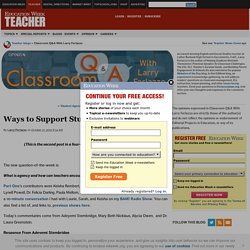
You can see Part One here.) The new question-of-the-week is: 'Student Agency Is Ownership' Using Class Jobs to Promote Student Voice and Choice in the Early Elementary Grades. One day I was reading with a group of my second graders during a rotation reading period when three students approached me: “My iPad isn’t charged.”
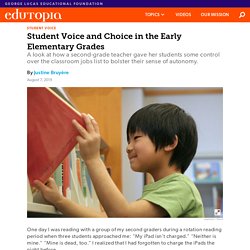
“Neither is mine.” “Mine is dead, too.” I realized that I had forgotten to charge the iPads the night before. That same week, I accompanied my class down to the lunch hall, but I forgot to bring our empty snack bag. This was a no-no—we could not collect our apples, pretzels, or the class favorite, cheese cubes, if we didn’t return the bag, so I ran to the classroom to grab it. Where I Went Wrong Traditionally, classroom job charts are created by teachers for students.
The problem was, my job chart didn’t reflect my belief that autonomy helps prepare students for life in a democratic society. Why Student Agency Matters - David Price - Medium. Flying back to the UK, after working in the Philippines and Australia for 2 months, was a sobering experience.
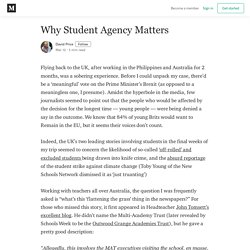
Before I could unpack my case, there’d be a ‘meaningful’ vote on the Prime Minister’s Brexit (as opposed to a meaningless one, I presume). Amidst the hyperbole in the media, few journalists seemed to point out that the people who would be affected by the decision for the longest time — young people — were being denied a say in the outcome. We know that 84% of young Brits would want to Remain in the EU, but it seems their voices don’t count. Indeed, the UK’s two leading stories involving students in the final weeks of my trip seemed to concern the likelihood of so-called ‘off-rolled’ and excluded students being drawn into knife crime, and the absurd reportage of the student strike against climate change (Toby Young of the New Schools Network dismissed it as ‘just truanting’)
Agents of learning – the Teen Inquiry Project. In Teacher’s latest reader submission, Year 9 Learning Leader Rachael Williams discusses student agency and shares details of a project at her own school that offers teens a learning experience that’s relevant to their own lives and gives them the opportunity to work with community experts.
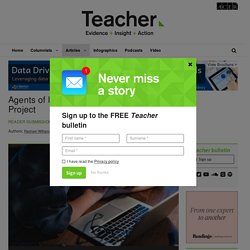
Schools often labour over the construction of a curriculum that matters but, ultimately, any decisions about what should or should not be included are usually made by adults. Surely teens are worthy of this responsibility, at least some of the time? Young people deserve learning experiences that build agency, ‘a sense that it’s possible to reshape the way things are by directing one’s actions purposefully (Tishman & Clapp, 2017, p.58)'.
Sparking student curiosity. In the first of two articles, Michelle Lucas – a Maths and Science teacher at Inaburra School, in New South Wales – shares an approach she’s developed to drive student agency and improve learning skills.
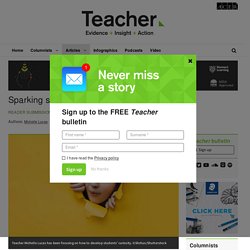
As a scientist (and now Science teacher) I have always had curiosity. My first science experiment was before I had even started primary school. The day my mother uncovered my many jars of mixed potions in a cupboard she didn’t say much; after all, she was a Science teacher and understood perfectly. Scientists are forever asking questions. After one answer is uncovered a plethora of questions come with it. 9 Things You Can Do to Support Student Agency With Formative Assessment - Next Gen Learning in Action. By Barbara Jones, a senior professional learning specialist for WestEd Sometimes when teachers see good formative-assessment lessons in action, they believe they represent unrealistic aspirations for their own classrooms.
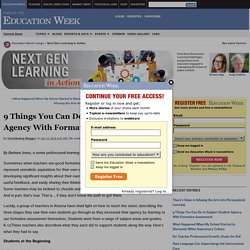
In these lessons, students may be developing significant insights about their own learning while assessing their work, giving each other useful feedback, and easily sharing their thinking with others while participating in rich discussions. How Can Students and Teachers Co-Design Learning? - Next Gen Learning in Action. By Jonathan G.
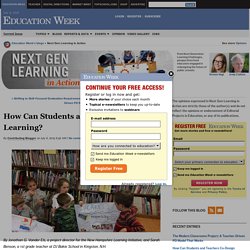
Vander Els, a project director for the New Hampshire Learning Initiative, and Sarah Benson, a 1st grade teacher at DJ Bakie School in Kingston, N.H. Jonathan G. Why It Is Time to Re-Imagine Our Education System. Over a century ago, our education leaders strove to determine how the American school system could support the needs of the industrial economy.
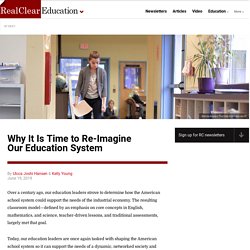
The resulting classroom model—defined by an emphasis on core concepts in English, mathematics, and science, teacher-driven lessons, and traditional assessments, largely met that goal. Today, our education leaders are once again tasked with shaping the American school system so it can support the needs of a dynamic, networked society and global economy. Young people must develop critical thinking, logical reasoning, creativity, and collaboration skills—a set of 21st century competencies and dispositions that are wildly different than those demanded by the industrial age. Serving all children this way requires a system that reaches beyond the conventional one we’re used to. Fortunately, we don’t have to start from scratch. 3 Ways to Build Student Agency into Your Lessons. Although many teachers recognize the importance of making students active agents in the classroom, it is easy to overlook student agency when we plan our lessons.
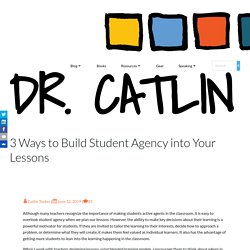
However, the ability to make key decisions about their learning is a powerful motivator for students. If they are invited to tailor the learning to their interests, decide how to approach a problem, or determine what they will create, it makes them feel valued as individual learners. It also has the advantage of getting more students to lean into the learning happening in the classroom. When I work with teachers designing lessons using blended learning models, I encourage them to think about where in the lesson they can hand over decision making power to the students. A simple approach is to think about the what, how, and why of a lesson, assignment, or project and give students the opportunity to answer one of those questions. Encouraging Student Voice and Choice in the Classroom. Presented by Richard Tso, Sr.
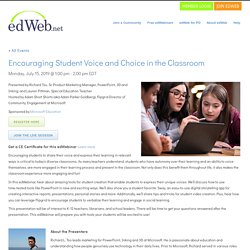
Product Marketing Manager, PowerPoint, 3D and Inking; and Lauren Pittman, Special Education Teacher Hosted by Adam Short Shorts (aka Adam Parker Goldberg), Flipgrid Director of Community, Engagement at Microsoft Sponsored by Microsoft Education Get a CE Certificate for this edWebinar Learn more. What the heck is student agency. Express e-Newsletter. Student Agency & How To Encourage It. I believe helping students develop “agency,” which is often defined as the ability to be pro-active in responding to your circumstances, is an important part of classroom – and life – success. Unfortunately, few include an important second part of the definition – recognizing that there could be outside limitations on a student’s pro-activity, and that omission can lead to what I call the “Let Them Eat Character!”
Element of Social Emotional Learning (see my Washington Post piece, The manipulation of Social Emotional Learning). Nevertheless, there are a number of actions we can take in the classroom to help students deal with both parts of that definition. Imagination, Inquiry, and Agency. Sparking Student Agency with Technology. Learner Agency, Technology, and Emotional Intelligence. Preface Early in my training as an educator, I was exposed to William Glasser’s conceptualization of basic human needs and their importance in creating a healthy educational setting. They are: Belonging – Fulfilled by loving, sharing, and cooperating with othersPower – Fulfilled by achieving, accomplishing, and being recognized and respectedFreedom – Fulfilled by making choicesFun – Fulfilled by laughing and playing They resonated deeply and made sense to me. Instructional strategies and learning activities should build in ways for learners to get these needs met.
The needs of freedom and power are of special note to this essay/topic: Freedom – This is the need to choose how we live our lives, to express ourselves freely, and to be free from the control of others. Why Is It so Hard to Teach K-12 Educators How to Personalize Learning? As a long-time music teacher and instructional technology coach, modeling has been key to my work for over a decade. The concept of gradual release of responsibility is second nature to me when working with students in grades K-12, but in my new role teaching graduate students in an education technology program, I am struggling to model so many of the practices I expect these teachers to use in their own classrooms.
Why is it so hard to teach K-12 educators how to promote student agency and to provide choices around content and pacing—why is it so hard to teach educators how to personalize learning? I am a faculty member at Loyola University Maryland in the Educational Technology Program for the School of Education. What student choice and agency actually looks like. Important for Students and Educators. There is a great deal of talk and focus on the need to improve student agency in our schools and rightfully so (see my post on this topic HERE). Empowerment and ownership need and should be associated with learning to increase relevancy, value, meaning, and outcomes.
The desire to increase agency in the form of voice, choice, and advocacy should be viewed as just as important for educators (teachers and administrators) as it is for students. For sustainable change and innovative practices to take hold let’s evaluate the level of educator agency in our schools. Image credit: www.peoplematters.in. 5 Ways to Promote Student Agency - Cooper on Curriculum.
6 Questions that Promote Learner Agency. I was talking with an educator who is deeply invested in his students and committed to promoting learner agency. He shared that he was really trying to create student-driven, authentic learning experiences. Yet when he asked his students to describe how they learn in school, most described him, the teacher, as the sole source of information. So what’s the disconnect you might wonder?
Establishing a Culture of Student Voice. Education culture can be just as powerful when students, like yoga class participants, are encouraged to help shape what and how learning takes place every day. It requires teachers to view what students can do alongside us. Building Students' Sense of Agency. Being the change we seek: How diverse voices strengthen schools. The Art and Science of Developing Student Agency - New Teacher Center : New Teacher Center. Sparking Student Agency with Technology. 10 Tips for Developing Student Agency - Vander Ark on Innovation. Agency is the capacity and propensity to take purposeful initiative--the opposite of helplessness.
Making sense of student agency in the early grades - kappanonline.org. The author suggests a conceptual framework to hep teachers understand the critical but elusive concept of student agency. Cultural Competency: Finding Ways to Bring Equity Through Personalized Learning. 8 reasons why my students lead their own conferences. I can clearly picture my eight-year-old self staring out the large window, waiting for my parents to come home from my parent-teacher conference. I wanted to know what my teacher said, how I was doing, and what was wrong with me.
The stress as the minutes ticked by increased as I got older, and the stakes were higher. As my parents shared the details with me, I am not sure I paid attention. How Professional Development and Networks for Teacher Support Can Enable Personalized Learning. On Student Voice and How All Means All. If I asked most of my students, they would consider me a great teacher for them. They would tell you how safe they feel in our classroom, how they feel respected, how they feel like what we do is worth their time. It is easy feeling like a great teacher if those are the only voices you pay attention to. But if you were to speak to a few, perhaps the ones who would need some extra goading, perhaps those who choose to remain mostly silent throughout our time together, a different story would emerge. Supercharging Student Voices – EdTech Digest. A veteran designer creates a remarkable video platform for millions of learners. INTERVIEW | by Victor Rivero Charles Miller is changing the world.
Top Ten Book Basket Labels Created by Kids by Tammy Mulligan and Clare Landrigan. Education experts say climate action offers students learning opportunities. Tomorrow, thousands of Australian school students are expected to join a global youth strike on climate change. Growth Over Grades: How a Resubmit Policy Is Helping Us Build a Culture of Revision. This is the second part of a two-part story about changing classroom culture. Student's Exhibit Uncovers Racist Past at Maryland Institute College of Art. Research conducted by a student exhibit at the Maryland Institute College of Art in Baltimore has uncovered examples of racism in the college’s history and developed an exhibit to showcases her findings. Deyane Moses’ exhibit, titled “Blackives: A Celebration of Black History at MICA,” features curated photos and documents that show how the college reacted after being forced in 1891 to admit African-American student Harry T. Promoting student agency through Individuals and Societies.
Transforming Education: Robotics and Its Value for Next Gen Learning - Next Gen Learning in Action. Innovative stop smoking projects created by students to be rolled out across Fife. How do you measure social and emotional learning? - Student Voice. Student Agency In The Library. Learner Agency: The Missing Link. 5 Ways to Promote Student Agency - Cooper on Curriculum.
WestEd’s Student Agency in Assessment & Learning Project. Student Agency. 10 Tips for Developing Student Agency. High Possibility Classrooms: Student Agency Through Technology-Enhanced Learning. Don’t Say “Agency” Unless You Really Mean It – sonya terborg. Learner Voice Demonstrates Commitment to Building Agency. Learner agency / Teaching.